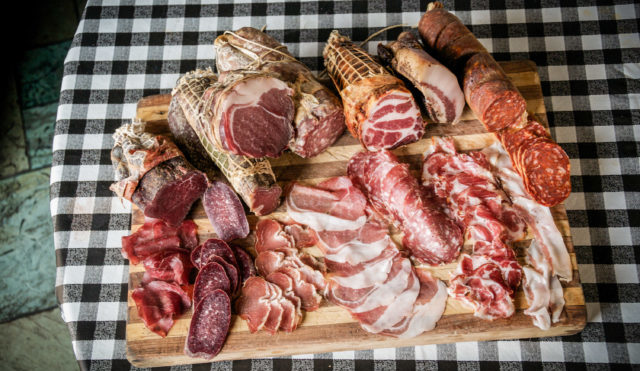
In only three years, Antonio “Tony” Fiasche has led the effort to pluck nduja, a spreadable salume, from the obscurity of a small Calabrian town and make it something of a sensation in the gourmet world.
The Wall Street Journal and foodie magazines have been salivating over it, and chefs worldwide are inventing ways to use it in pizza, vinaigrette, aioli, arrabiata, marinara, hollandaise and more.
The skyrocketing acclaim of Fiasche’s company, Nduja Artisans, has engendered plans to open a gourmet deli just west of the Loop in the near future. But like many success stories, Fiasche’s began decades earlier.
His father, Agostino, arrived as a teenager in the mid-1970s, got a job washing dishes at an Italian restaurant, and worked his way up to chef at the former Fettucine’s in Norridge. Along the way, he met and married Fiasche’s mother, Anna, who arrived from Naples as a young teen in the 1970s.
Both Agostino and Anna were professional chefs by the time they opened Ristorante Agostino Gustofino on Harlem Avenue on Chicago’s Northwest Side in 1985, with Anna doing the cooking at first.
“When they opened the restaurant, the word ‘foodie’ didn’t exist, but they were focusing on quality,” says Fiasche, 33.
One day. a customer who frequently ordered foodie-type products online brought them a rarity he had found: a spicy, spreadable sausage called nduja (pronounced en-DOO-zha in the Calabrian dialect, though commonly pronounced en-DOO-ya in America).
 “My dad tasted it and said, ‘No, this is not the way it’s supposed to taste. How much are they charging for this?’” Fiasche recalls. It turns out that Coccorino — Agostino’s hometown in southwestern Calabria near the Tyrrhenian Sea — is just five minutes away from Spilinga, which Fiasche credits as the birthplace of nduja.
“My dad tasted it and said, ‘No, this is not the way it’s supposed to taste. How much are they charging for this?’” Fiasche recalls. It turns out that Coccorino — Agostino’s hometown in southwestern Calabria near the Tyrrhenian Sea — is just five minutes away from Spilinga, which Fiasche credits as the birthplace of nduja.
In fact, he recalls sampling nduja and other local specialties during family visits to his grandparents in Calabria when he and his sisters were younger.
Father and son started experimenting with making nduja, soppressata, coppa and other salumi on Mondays when Ristorante Agostino was closed. Then they leased a USDA-approved food processing facility in Franklin Park and began grinding, creating, drying and packaging their salumi. Their drying room alone can fit 70,000 pounds of salumi.
Fiasche sent samples to chefs around the country and received positive responses.
“One chef told us it was the best in the country, and he got us into Bon Appetit magazine,” recalls Fiasche, who runs the salumi business while his parents and one of his sisters work at Ristorante Agostino.
Another big break occurred when Eataly decided to carry Nduja Artisans products, and then Marianos did the same. The company’s website (ndujaartisans.com) lists specialty shops throughout the United States and Canada that carry the its nduja and other salumi.
Nduja differs from most salumi in that it contains about 30 percent vegetables, specifically Calabrian sweet and hot peppers. It also contains humanely-raised pork and pork fat sourced from farms in the Midwest.
Njuja has a spreadable consistency, and the simplest way to eat it is to spread it on plain or grilled bread. “Think of it as pork butter,” said Fiasche. “It has a higher fat content than regular salumi.”
It melts when heated in a pan, and chefs often use the rendered pork fat’s flavor profile to give depth to pasta sauces, vinaigrettes and other types of sauces.
Fiasche is looking to purchase his own food processing facility within two years and is gearing up to open Tempesta Market at 1372 W. Grand Avenue in Chicago’s West Town neighborhood later this year. The market will serve up njuja and other salumi products, sandwiches, prepared foods and specialties.
The name tempesta, which means storms or high winds, is a nod to the Windy City, he says,.
But it also perfectly fits the way Nduja Artisans has taken the market by storm in the past few years, as nduja grows in popularity and brings another Italian delicacy to more and more menus and tables around the world.
 Fra Noi Embrace Your Inner Italian
Fra Noi Embrace Your Inner Italian






